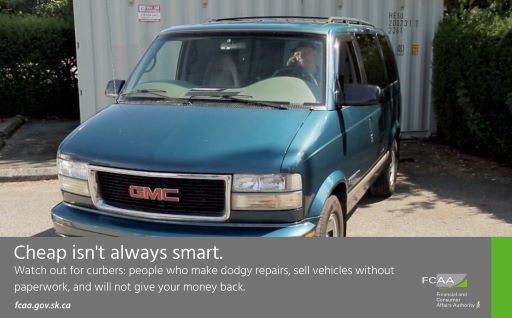Released on November 20, 2019
The Financial and Consumer Affairs Authority of Saskatchewan (FCAA) wants consumers to watch out for curbers. A curber is an individual or dealer who does not have a vehicle dealer license and who is in the business of buying and selling vehicles to make a profit.Often, curbers pose as private sellers and they often buy vehicles from auction or salvage, clean them up, make superficial repairs, and then sell them without providing any vehicle history or disclosure to the consumer.

How do I know if I am dealing with a curber?
- Documentation does not match - Compare their ID to the vehicle registration form (don’t accept a photocopy). If the seller’s ID doesn’t match the registration, be careful, this is a red flag.
- Below Market Value – Vehicles for sale are often priced below market value. If the price seems “to good to be true,” that’s a red flag.
- Multiple listings - Do you see the same phone number and different names with multiple vehicle listings in ads? You may be looking at a curber vehicle.
- No inspections - Curbers often refuse to allow a vehicle inspection by a mechanic. This is a red flag.
- Meet at a coffee shop or the mall – Curbers do not want you to know where they live or do business, so some curbers may insist on meeting at coffee shops or mall parking lots to show you the vehicle and finalize the sale.
- Cash sales only - Curbers love cash sales. Cash is hard to track and leaves no paper trail.
- Sob story - Curbers use sob stories to play to a person’s general good nature and kindness. They will use these stories to rush the sale, using guilt and sympathy to keep a person distracted from evaluating the vehicle properly. Buying from a curber is risky and you have no protections compared to buying from a licensed dealer.
Curbers often don’t provide that information to consumers. Licensed dealers must:
- disclose the vehicle’s history including any prior accidents;
- ensure the vehicle meets the minimum safety requirements to be driven, unless expressly disclosed;
- certify that the vehicle is free from liens, unless expressly disclosed;
- use an approved form of contract for the sale of the vehicle;
- be bonded;
- have a locatable address; and
- comply with statutory warranty rules.
If you notice someone selling vehicles for profit in Saskatchewan, check FCAA 411 to see if they have a license. If they do not, they may be a curber. You can report them to us by email at consumerprotection@gov.sk.ca or by calling 887-880-5550.
If you believe the person you purchased a vehicle from is operating as an unlicensed dealer, you can report them to us by email at consumerprotection@gov.sk.ca or by calling 887-880-5550.
FCAA can prosecute, and issue compliance and cost orders to curbers. Penalties for unlicensed selling are up to $100,000 for a business and up to $50,000 for an individual.
To learn more about curbers, visit our website at https://fcaa.gov.sk.ca/consumers-investors-pension-plan-members/consumers/consumers-of-goods-and-services/purchasing-and-repairing-a-vehicle/curbers.
-30-
For more information, contact:
Shannon McMillan
Financial and Consumer Affairs Authority
Regina
Phone: 306-798-4160
Email: shannon.mcmillan@gov.sk.ca
